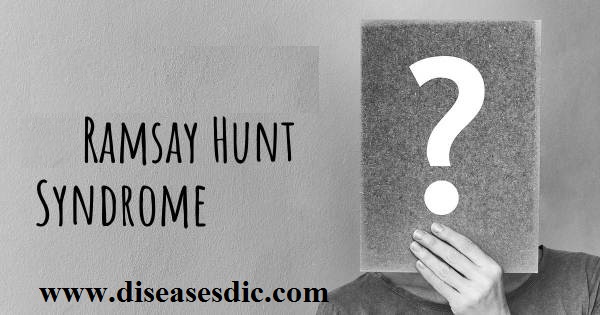Description
Ramsay hunts syndrome (RHS) is a very rare disorder caused by the varicella-zoster virus. It is the virus that causes chickenpox and shingles. RHS is the outbreak of shingles which occurs on the facial nerves that are near the inner ear. After this, the facial nerve becomes swollen, irritated and finally causing facial weakness or paralysis.
In additional cases, a red, painful rash with blisters is found in the ear canal, eardrum and sometimes the mouth. In some patient, poly-cranial neuropathy may occur which cause sensorineural hearing loss, balance dysfunction, abnormalities in facial sensation, vocal cord paralysis and even tongue weakness.
Pathophysiology of ramsay hunts syndrome
During the primary infection of VZV, it invades the geniculate ganglia. The virus remains dormant in the ganglia without producing another disease. In some individuals these dormant virus reactivates and pass along the pathways of geniculate ganglion, producing the pain and skin lesion as a symptom of shingles.
The reason behind the virus reactivation is not fully studied, theoretically, it is substantiated that a decrease in cell-mediated immunity may play an important role in the evolution of this disease by allowing the virus to multiply in the ganglia and spread to the corresponding sensory nerves, producing clinical disease.
Causes
- Varicella zoster, the virus that causes chickenpox and shingles is the root cause of Ramsay Hunt syndrome.
- It is caused by reactivation of a previous Varicella-zoster virus (VZV) infection
Risk factors of ramsay hunts syndrome
- Patients who had chickenpox in the past are prone to develop shingles and later on Ramsay Hunt syndrome.
- The higher risk include weakened immune system
- Living along with a person who is under contract with chickenpox
- Increasing age and various diseases (HIV infection and certain malignancies)
- Immunocompromised disease states
Epidemiology
- The overall incidence of all types of herpes zoster is estimated to be 3.6 cases per 1,000 person-years.
- Of patients presenting with lower motor neuron facial palsy, 12% have Ramsay Hunt syndrome but the diagnosis can be missed if there is no rash (herpes zoster sine herpete)
Symptoms
You may not have all symptoms but some symptoms may develop later than others. Some of the common symptoms that include:
- A rash or blisters on or around the ear, scalp or hairline. The blisters may also appear inside the mouth.
- The rash or blisters are often painful with a generalized sensation of burning over the affected area.
- Weakness on the affected side of your face which causes the facial muscles to droop.
- Difficulty closing the eye or blinking on the affected side.
- Altered taste on the affected half of the tongue.
- Loss of facial expression on the affected side.
- Difficulty when eating, drinking and speaking as a result of weakness in the lip and cheek on the affected side.
- Ear, face or head pain.
- Hearing loss on the affected side
- Dizziness/vertigo
- Tinnitus (ringing in the ear) on the affected side.
Symptoms of RHS (blisters in the ear)
Complications of ramsay hunts syndrome
Complications of Ramsay Hunt syndrome may include:
- Permanent hearing loss and facial weakness.For most people, the hearing loss and facial paralysis associated with Ramsay Hunt syndrome are temporary. However, it can become permanent for some people.
- Eye damage.The facial weakness caused by Ramsay Hunt syndrome may make it difficult for you to close your eyelid. Incomplete eyelid closure can lead to damage of the protective dome of clear tissue over the front of your eye (cornea). This damage can cause eye pain and blurred vision.
- Postherpetic neuralgia.This painful condition occurs when a shingles infection damages nerve fibers. The messages sent by these nerve fibers become confused and exaggerated — causing pain that may persist long after other signs and symptoms of Ramsay Hunt syndrome have faded.
Diagnosis and test
Ramsay Hunt syndrome is often diagnosed based on the medical history of the patient and physical exam.
- In some cases, laboratory confirmation of a clinical diagnosis is based on increasing antibody titer in repeated complement fixation tests.
- Polymerase chain reaction can detect VZV in saliva, tears, middle ear fluid, and blood mononuclear cells.
Treatment and medications
Early treatment against this virus can decrease pain and reduce the danger of long-lasting problems. Medicines possibly will contain:
Pain relievers: The pain related to Ramsay Hunt syndrome might be simple. Narcotic drugs, for example, those including hydrocodone (Lortab, Vicodin, others) or oxycodone (Oxycontin, Percocet, others) possibly will be needed.
Corticosteroids: A small regiment of high amount prednisone seems to increase the outcome of antiviral drugs in this particular Virus, Ramsay Hunt syndrome.
Antiviral drugs: Medicines, for example, valacyclovir (Valtrex), famciclovir (Famvir) or acyclovir (Zovirax) frequently aid to get rid of the virus of chickenpox.
Anti-anxiety medications: Drugs similar to diazepam (Valium) possibly will assist in dismissing vertigo.
Prevention of ramsay hunts syndrome
- First, take steps to ensure that your immunity against chickenpox is strong.
- If you have not had a medical professional vaccinate you for chickenpox yet, then you should see your doctor as soon as you can.
- Also, strengthen your immunity by loading up your diet with antioxidants that can help your body fight against harmful free radicals.
- You may want to supplement your diet with organic sources of antioxidants such as Klamath Blue Green Algae extracts upon the recommendation of a healthcare professional.

